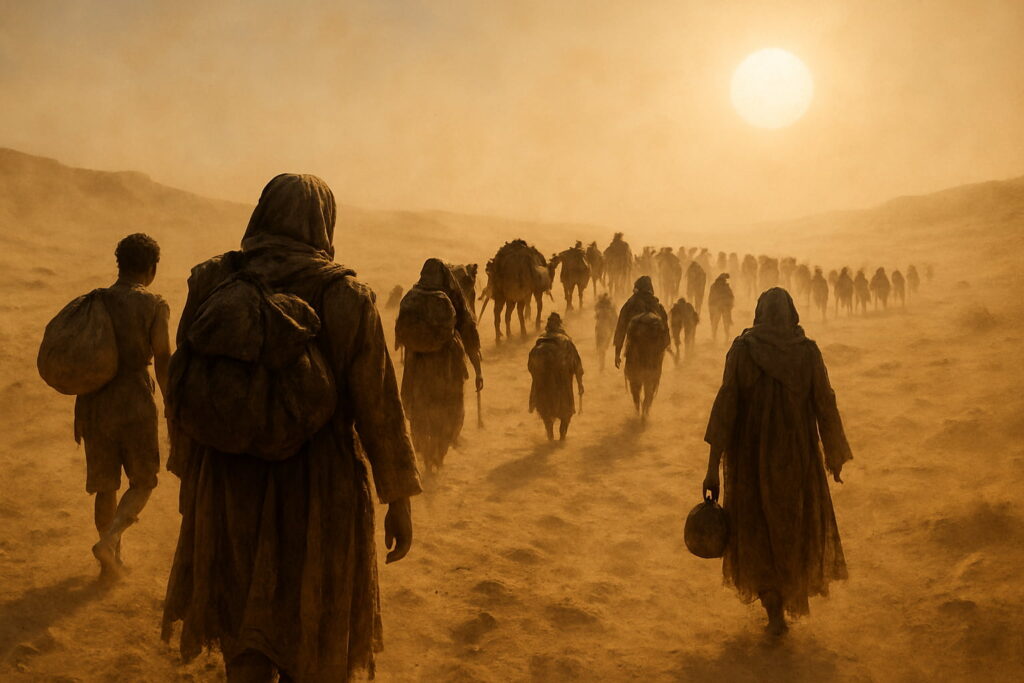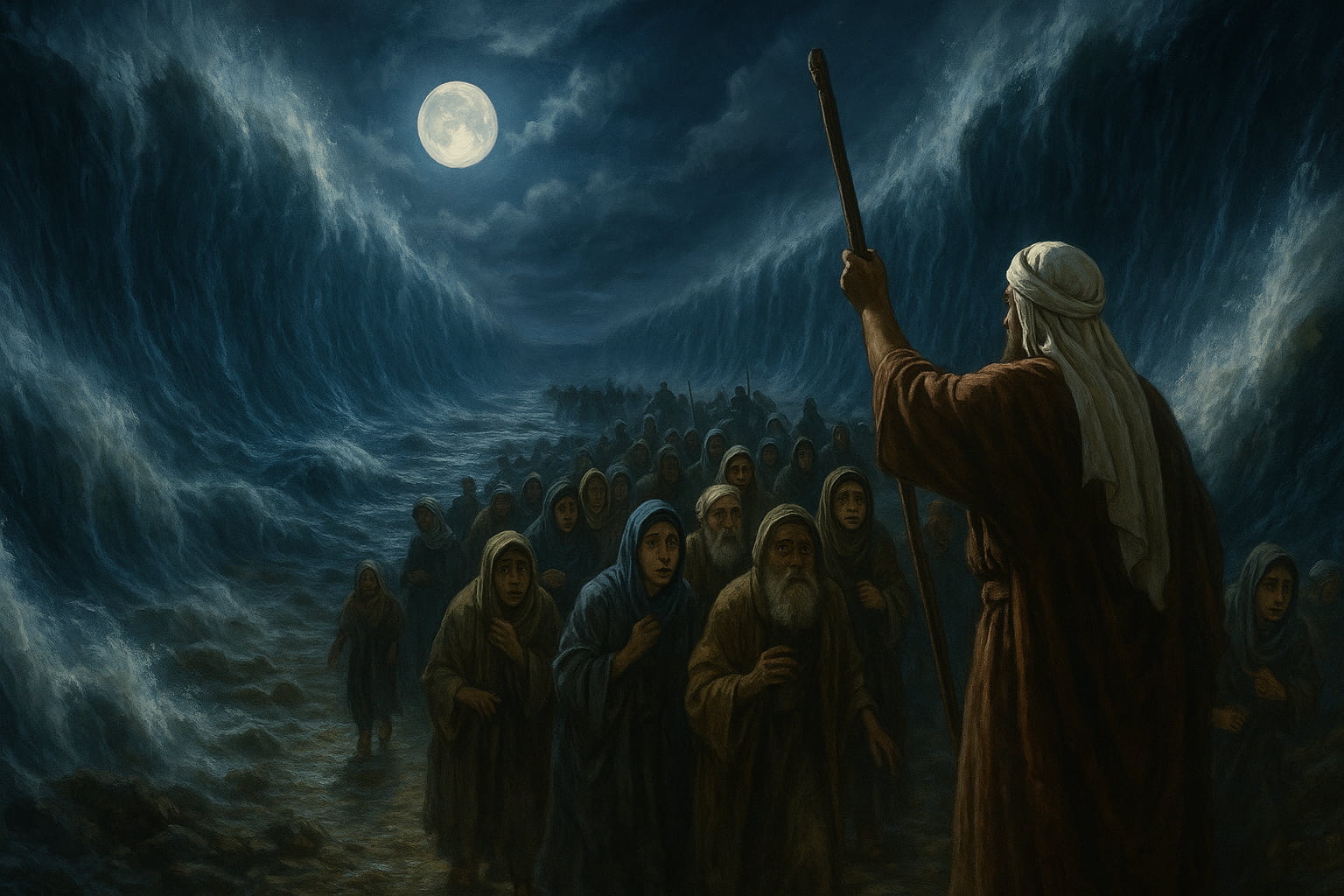The story of Bani Israil (Children of Israel) is one of the most detailed and profound narratives in the Quran. Their history, struggles, and divine lessons provide insight into faith, obedience, and human behavior. Understanding Bani Israil is crucial for Muslims seeking to reflect on Allah’s guidance and warnings. This post explores who they were, their history, and vital lessons drawn from the Quran.
Who Are Bani Israil According to the Quran?
The term Bani Israil refers to the descendants of Prophet Yaqub (Jacob, peace be upon him), who is also called “Israel” in Islamic tradition. They are mentioned extensively in the Quran, serving as an example of a nation entrusted with Allah’s guidance.
Their story unfolds across several Surahs, including Al-Baqarah, Al-Ma’idah, and Al-A’raf, where they are recognized as a chosen nation who received divine blessings, including prophethood, holy scriptures (Taurat), and sustenance. However, they are also reminded of their responsibilities in fulfilling Allah’s covenant.
What Is the Other Name of Bani Israil?
Bani Israil, often referred to as the “Children of Israel,” is a term that directly links this group to Prophet Yaqub (Israel, peace be upon him), one of the great prophets of Allah. The name emphasizes their lineage as descendants of a righteous and blessed forefather who was chosen by Allah for his piety and devotion. Prophet Yaqub, also known as Israel, was the son of Prophet Ishaq (peace be upon him) and the grandson of Prophet Ibrahim (peace be upon him), forming part of a lineage of profound faith and guidance.
The term “Bani Israil” not only signifies their ancestral heritage but also reminds them of their connection to a legacy of divine blessings and responsibilities entrusted to their forefathers..
Who Is the Father of Bani Israil?
Prophet Yaqub (peace be upon him), also known as Jacob, is regarded as the father of Bani Israil (the Children of Israel). He was the grandson of the great Prophet Ibrahim (Abraham, peace be upon him) and the son of Prophet Ishaq (Isaac, peace be upon him).
Yaqub was chosen by Allah as a prophet and was blessed with immense wisdom, patience, and faith. He had twelve sons, who became the ancestors of the twelve tribes of Bani Israil, forming the foundation of a significant lineage in religious history. Among his sons was Prophet Yusuf (Joseph, peace be upon him), whose remarkable story of trials and triumphs is narrated in the Qur’an, showcasing the importance of steadfast belief and trust in Allah’s plan. Prophet Yaqub’s life is a testament to unwavering devotion and resilience in the face of challenges..
Were Bani Israil Arabs?
No, Bani Israil were not Arabs. Their lineage traces back to Prophet Ishaq (peace be upon him), the son of Prophet Ibrahim (peace be upon him), which distinguishes them from the Arabs, who descend from Prophet Ismail (Ishmael, peace be upon him), Prophet Ishaq’s brother.
Bani Israil’s origins are rooted in the region of Canaan (modern-day Palestine), a land historically associated with their ancestors and prophets. However, their history is marked by significant events, including migration to Egypt during the time of Prophet Yusuf (Joseph, peace be upon him) and later enslavement under the rule of Pharaoh. This was followed by their liberation under the leadership of Prophet Musa (Moses, peace be upon him), which remains a defining chapter in their collective history..
What Is the History of Bani Israil?
The history of Bani Israil is rich with events that shaped their identity and faith. Among the key milestones are:
- Migration to Egypt under Prophet Yusuf (Joseph, peace be upon him) during a famine.
- Life under Pharaoh’s oppression, where they suffered enslavement and persecution.
- Rescue by Prophet Musa (Moses, peace be upon him), who led them out of Egypt, crossing the Red Sea.
- Wandering the desert for 40 years due to their disobedience after rejecting Allah’s commandments.
- Entrance into Jerusalem, a fulfillment of Allah’s promise to them.
Why Did Allah Favor Bani Israil?
The Quran highlights Allah’s immense blessings upon Bani Israil. They were chosen to carry the divine message and received numerous gifts, such as:
- Prophets sent to guide them, including Musa, Harun, Dawud, and Sulaiman (peace be upon them).
- Revelation of the Taurat (Torah).
- Sustenance in the form of manna and quail during their time in the desert.
However, Allah’s favor was conditional on their obedience and gratitude, a covenant they often broke.
Who Are the Five Prophets of Bani Israil?
Many prophets were sent to Bani Israil, but some of the most prominent include:
- Musa (Moses, peace be upon him), who was chosen by Allah to lead Bani Israil out of slavery in Egypt, guiding them through the miraculous parting of the sea to escape Pharaoh’s tyranny. He was also the recipient of the Taurat (Torah), which served as a divine guidance for his people.
- Harun (Aaron, peace be upon him), the brother of Musa, played a vital role in supporting him as a prophet and spokesperson. He assisted in conveying Allah’s message to Bani Israil and helped Musa in guiding and uniting the people, especially during times of difficulty and doubt.
- Dawud (David, peace be upon him), both a king and a prophet, was renowned for his wisdom, courage, and devotion to Allah. He was gifted with the Zabur (Psalms) and was known for his beautiful recitation. His leadership was marked by justice, and he was a symbol of piety and strength in serving Allah.
- Sulaiman (Solomon, peace be upon him), the son of Dawud, was blessed with unmatched wisdom, justice, and the ability to communicate with animals and command the jinn. His reign was characterized by prosperity and fairness, and he used his extraordinary powers to rule with righteousness and uphold the principles of Allah.
- Isa (Jesus, peace be upon him), born miraculously to Maryam (Mary) without a father, was a pivotal prophet for Bani Israil. He performed numerous miracles by Allah’s will, such as healing the sick and bringing the dead back to life. His message emphasized faith, mercy, and devotion to Allah, and his prophethood was a significant turning point in the history of Bani Israil..
Which Prophet Was Born in Bani Israil?
Isa (peace be upon him), also known as Jesus, was born among Bani Israil and holds a central place in Islamic teachings as one of the greatest prophets. His miraculous birth to Maryam (Mary), a pious and devout woman chosen by Allah, was a powerful sign of Allah’s will and ability to create without limitation.
Isa (peace be upon him) was sent to guide Bani Israil back to the path of righteousness, teaching them to worship Allah alone and to live morally upright lives. Despite the wisdom and miracles he brought, such as healing the sick and bringing the dead back to life by Allah’s permission, many from Bani Israil rejected his message and opposed him, leading to significant divisions among them. His life and mission continue to serve as a testament to Allah’s guidance and mercy for humanity..
Which Prophet Was Killed by Bani Israil?
The Quran strongly condemns Bani Israil for their grave sin of killing prophets, a crime that reflects their disobedience and arrogance despite the repeated guidance and mercy of Allah. Among those martyred were Prophet Zakariyya (Zechariah) and his son, Prophet Yahya (John the Baptist, peace be upon them), both of whom dedicated their lives to calling people towards righteousness and the worship of Allah alone.
Despite their unwavering commitment to truth and their status as chosen messengers, they were met with hostility and ultimately killed by those who rejected their message. This tragic history serves as a powerful reminder of the consequences of turning away from divine guidance and the importance of honoring those sent by Allah to lead humanity on the straight path..
What Was the Sin of Bani Israil?
Bani Israil were guilty of several transgressions, including:
- Disobedience to Allah’s commands, such as worshiping the golden calf during Prophet Musa’s time.
- Killing prophets and rejecting divine messages.
- Altering the scriptures for personal gain.
These actions drew Allah’s displeasure and serve as warnings to all nations.
Why Did Allah Punish Bani Israil?
When Bani Israil repeatedly broke their covenant with Allah by turning away from His guidance and engaging in acts of disobedience and arrogance, they faced severe divine punishments. These punishments served both as a consequence of their actions and as lessons for others. The punishments included:
- Exile and dispersal from their homeland, leaving them scattered across different regions without the unity and stability they once enjoyed.
- Loss of their status as a favored nation, as their repeated transgressions caused them to lose the blessings and favor Allah had originally bestowed upon them.
- Humiliation and various forms of suffering, as mentioned in the Quran, including subjugation by other nations and a sense of disgrace resulting from their actions.
Their story serves as a powerful reminder of the importance of accountability, the dangers of arrogance, and the consequences of turning away from divine guidance. It highlights how blessings can be taken away when they are not valued or upheld with gratitude and obedience..
What is the Lesson of Surah Bani Israel?
Surah Bani Israel, also known as Surah Al-Isra, imparts profound lessons about the principles of faith, accountability, and morality. One of the core messages of this Surah is the importance of staying steadfast on the path of righteousness and valuing the blessings that Allah provides. It emphasizes how turning away from divine guidance can lead to significant consequences, not just for individuals, but for entire nations.
The Surah also underlines the necessity of humility and gratitude, reminding believers of the fleeting nature of worldly gains and the eternal significance of spiritual closeness to Allah. Ultimately, it calls for self-reflection, obedience to Allah’s commands, and a commitment to justice and compassion in every aspect of life.

Who are the Israelites in the Quran?
The Israelites, referred to as “Bani Israel” in the Quran, are a prominent group mentioned throughout its verses. They are depicted as descendants of Prophet Yaqub (Jacob, peace be upon him), who was also known as Israel. The Quran highlights their experiences with Prophets, the blessings they received from Allah, and the trials they faced due to their disobedience and arrogance.
From the miraculous rescue from Pharaoh’s tyranny to their transgressions in worshiping the golden calf, the Quran uses their story as a profound lesson for humankind. Their narrative emphasizes the importance of steadfast faith, gratitude, and adherence to divine guidance. Ultimately, their account serves as a reminder of Allah’s justice, mercy, and the consequences of both faithfulness and rebellion.
Who Was the King of Bani Israel?
The first king of Bani Israel was Saul, known as Talut in the Quran. His appointment as king was ordained by Allah through the Prophet Samuel, despite initial resistance and skepticism from the people due to his humble background and lack of wealth.
Talut was chosen for his strong character, wisdom, and physical stature qualities necessary to lead his people in the face of challenges. Under his leadership, Bani Israel achieved significant victories, including the famous battle against the mighty army of Goliath (Jalut), where the young Prophet Dawud (David) emerged as a hero. Talut’s story highlights the virtues of humility, faith, and obedience to Allah’s will in achieving success.
What Was Allah’s Warning to Bani Israil?
The Quran contains clear and direct warnings to Bani Israil about breaking their covenant with Allah. It highlights their repeated failures to honor their promises and warns of the consequences of corruption, disobedience, and oppression.
Allah reminds them of the blessings they were given, urging them to reflect on their actions and uphold justice, truth, and righteousness. These warnings serve not only as a reminder to Bani Israil but also as a lesson for all believers to remain steadfast in their faith and commitments, emphasizing the importance of accountability and moral integrity..
Modern Reflections on Bani Israil and Israel
It’s important to distinguish between the historical Bani Israil mentioned in the Quran and the modern political state of Israel. The Bani Israil, as referenced in the Quran, is a spiritually significant nation with a unique role in religious history, often cited in the context of divine guidance, trials, and moral lessons. In contrast, the modern state of Israel is a geopolitical entity established in 1948, rooted in contemporary political history and global dynamics.
While both share a name, their contexts are entirely different, and it is crucial to avoid conflating the historical and spiritual narrative of Bani Israil with the complex and often contentious Arab-Israel tensions in the modern era. Understanding this distinction helps maintain clarity when discussing religious texts and current political affairs..
Lessons for Muslims Today
The story of Bani Israil is not just a tale of the past but a mirror for Muslims today. It teaches us:
- To remain obedient to Allah’s commands and grateful for His blessings.
- To avoid arrogance, corruption, and division.
- To uphold the truth and fulfill our responsibilities as an ummah.
By reflecting on their story, we can strive to learn from their mistakes and apply these lessons to our lives.









